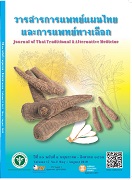Physico-Chemical Properties of Moringa oleifera Lam. Dried Leaves
Main Article Content
Abstract
Ma-Rum (Horseradish Tree, Drumstick Tree) has the scientific name as Moringa oleifera Lam., belonging to Family Moringaceae. This plant is native to India and cultivated in Asia, Central and South America, Africa, and Pacific. In Thailand, it was cultivated in almost every region. For Thai traditional medicine, the leaves have been used as bleeding-stopped, lactagogue, hypnotic, and anti-scurvy. Since the chemical standardization of the Horseradish Tree’s dried leaves in Thailand has not yet been studied, therefore it is worthwhile to study its physico-chemical properties. Twenty-three samples were collected from natural areas and Thai drugstores. As a result, the properties were shown as the followings (mean + SD): the moisture, the total ash, the acid-insoluble ash, the water-soluble extractive, the 95% ethanol-soluble extractive, and the total polyphenol contents (calculated on the dried-basis as gallic acid), using Folin-Ciocalteu’s method, were equal to 7.47 ± 1.14, 11.13 ± 1.12, 0.23 ± 0.18, 35.69 ± 2.94, 17.89 ± 2.74, and 16.95 ± 2.67 %w/w, respectively. The thin-layer chromatographic identification showed all samples were positive to flavonoids and contained astragalin. Thus, it will be helpful to set up the standardization in Thai Herbal Pharmacopoeia which will be useful for consumers’ protection and commercial support.
Article Details
References
2. Chayamarit C. Key Characters of Plant Families. Bangkok: Agricultural Cooperative Printing Federation of Thailand Co., Ltd; 2005. (in Thai).
3. Lianli L, Olson ME. Moringaceae. In Raven PH, Al-Shehbaz I, Zhu G. Flora of China. Missouri: Botanical Garden Press. 2001;8:196.
4. Faculty of Pharmaceutical Sciences, Ubon Ratchathani University. Marum [internet]. [cited 2019 May 10].Available from: https://www.phargarden.com/main.php?action=viewpage&pid=97 (in Thai).
5. Srisuk V. Marum. Medicinal plants, a variety of benefits. Medical plant newsletter [internet]. 2009 July [cited 2019 May 10]; 26(4): Available from: https://www.pharmacy.mahidol.ac.th/knowledge/files/0008.pdf (in Thai).
6. Herbal Drug List, National List of Essential Medicines, Public Health Ministry; 2012. (in Thai).
7. Sahakitpichan P, Mahidol C, Disadee W, Ruchirawat S, Kanchanapoom T. Unusual glycosides of pyrrole alkaloid and 4"-hydroxyphenylethanamide from leaves of Moringa oleifera. Phytochem. 2011;72:791–5.
8. Barkre AG, Aderibigbe AO, Ademovo OG. Studies on neuropharmacological profile of ethanol extract of Moringa oleifera leaves in mice. J Ethnopharmacol. 2013, 149:783-9.
9. Hannan MA, Kang JY, Mohibbullah M, Hong YK, Lee H, Choi JS, Choi IS, Moon IS. Moringa oleifera with promising neuronal survival and neurite outgrowth promoting potentials. J Ethnopharmacol. 2014;152:142-50.
10. Razis AFA, Ibrahim MD, Kntayya SB. Health Benefits of Moringa oleifera. Asian Pac J Cancer Prev. 2014;15(20):8571-6.
11. Chivapat S, Sincharoenpokai P, Saktiyasuthorn N, Shuaprom A, Thongsrirak P, Sakpetch A, Rungsipipat A. Acute and chronic toxicity of Moringa oleifera leaves extracts. Thai J Vet Med. 2011;41(4):417-24.
12. Awodele O, Oreagba IA, Odoma S, da Silva JA, Osunkalu VO. Toxicological evaluation of the aqueous leaf extract of Moringa oleifera Lam. (Moringaceae). J Ethnopharmacol. 2012;139(2):330-6.
13. Department of Medical Sciences, Ministry of Public Health. Thai Herbal Pharmacopoeia 2018. Bangkok: Keawjawjom Printing & Publishing SuanSunandhaRajabhat University; 2018.
14. Everette JD, Bryant QM, Green AM, Abbey YA, Wangila GW, Walker RB. A thorough study of reactivity of various compound classes towards the Folin-Ciocalteu reagent. J Agric Food Chem. 2010;58(14):8139-44.
15. Riaz A, Rasul A, Hussain G, Zahoor MK, Jabeen F, Subhani Z, Younis T, Ali M, Sarfraz I, Selamoglu Z. Astragalin: A bioactive phytochemical with potential therapeutic activities. Adv Pharmacol Sci. 2018;2018:9794625. doi:10.1155/2018/9794625. PMCID: PMC5954929 PMID:29853868.


